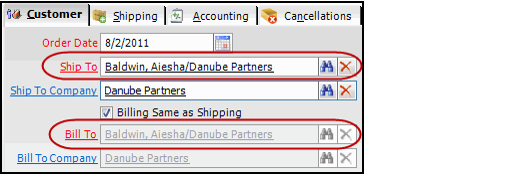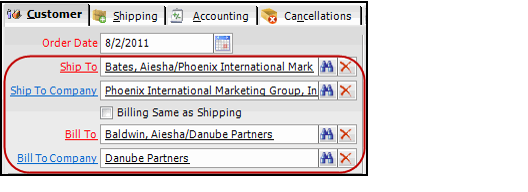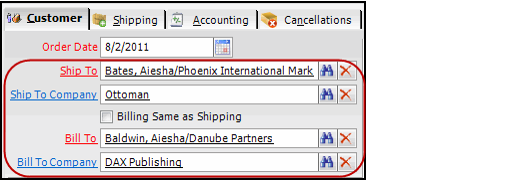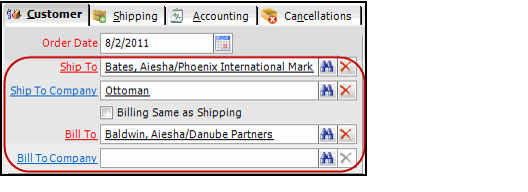Understanding the Relationship between Persons, Companies, and Orders
In Aptify, a Persons record is typically associated with a company. The Company field in the top area of the Persons form specifies the person's primary company affiliation (generally, the person's employer). However, a person does not need a company affiliation to have a record in Aptify.
When you enter a person as the Ship To or Bill To on an order, if the person has a primary company affiliation, Aptify automatically adds that company as the Ship To Company and/or Bill To Company. If the person does not have a primary company affiliation specified, the Ship To Company and/or Bill To Company remains blank.
When a company is specified on an order, Aptify treats the order as a company order, that is, the order is assumed to be on the behalf of the company. For example, when a Ship To Company is specified, the company is the Ship To party for the order, regardless if there is a person specified in the Ship To field. Likewise, when a Bill To Company is specified, the company is the Bill To party for the order, regardless if there is a person specified in the Bill To field. With Aptify, you do not need to specify a Ship To Person. When the order is saved, the Ship To Person is saved as "Not Specified" to note that the order is a company only order. In both cases, the Order Party field is automatically updated to Company.
If Ship To or Bill To party for an order is actually the Ship To or Bill To Person, a user can clear the Ship To Company and/or Bill To Company. In this case, Aptify treats the order as an individual order. In this case, the Order Party field is automatically updated to Individual. See the figure below for an example.
Restricting Country Where Orders May Be Shipped
In Aptify, an administrator can configure a list of restricted countries where orders cannot be shipped. See the ValidateShipToLocation attribute in About Orders Entity Attributes for more details.
In many cases, the Ship To party and the Bill To party on an order are the same (that is, the Billing Same as Shipping option is selectedd). However, Aptify also supports any combination of Ship To/Bill To designations, including:
- Different Ship To and Bill To Parties: In this case, one Person/Company appears in the Ship To fields and a second Person/Company appears in the Bill To fields. To specify a different Bill To (when the preferred Bill To and Ship To addresses are the same), clear the Billing Same as Shipping option. See the figure below for an example. If the specified Ship To Person or Ship to Company has different preferred addresses for Shipping and Billing, Aptify uses the same person and/or company in both the Ship To and Bill To fields but it automatically unchecks the Billing Same as Shipping box and flows down different Ship To and Bill To addresses.
- Ship To/Bill To Company Is Not Person's Primary Company: Although a person's primary company affiliation appears in the Ship To/Bill To Company field by default, a user can manually enter any company on the order, even if the company is not the primary company for the person specified. See the figure below for an example.
- Hybrid Corporate/Individual Orders: In some cases, a user may need to specify a Ship To Company (for a corporate Ship To order) but leave the Bill To Company blank (for an individual Bill To order), or vice versa. Seethe figure below for an example.
In all of the cases described above, Aptify uses the characteristics of the specified Ship To party to complete the shipping information for the order, and Aptify uses the characteristics of the specified Bill To party to complete the billing information for the order. The Bill To and Ship To characteristics used on an order are described below.
Copyright © 2014-2019 Aptify - Confidential and Proprietary



